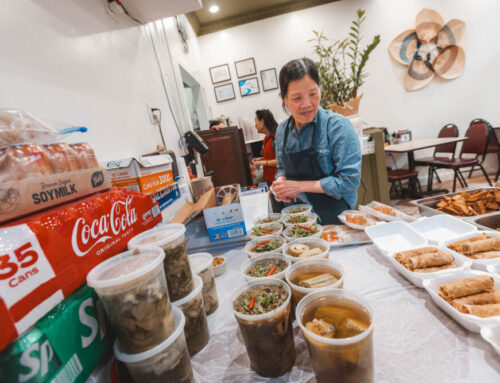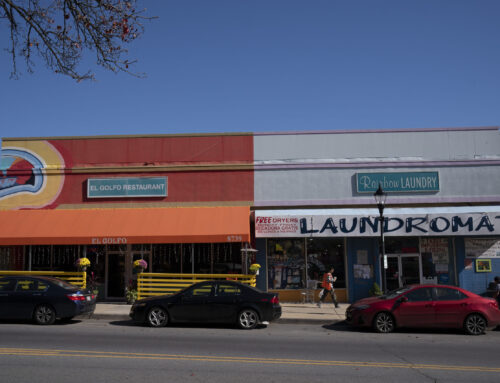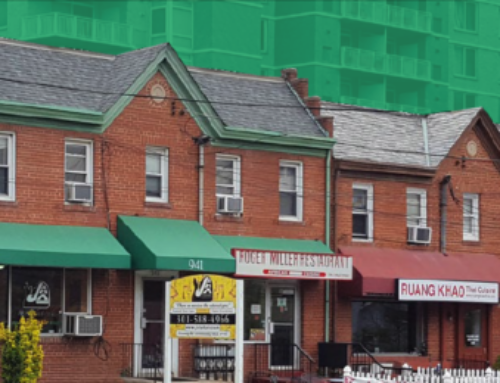SBAN Member News Roundup, Spring/Summer 2023

(PHOTO: Mercado del Pueblo, a small business incubator run by SBAN member the Puerto Rican Cultural Center, Chicago.)
In this Spring/Summer 2023 SBAN Member News Roundup, we highlight members in the news and report on their diverse anti-displacement efforts over the last few months.
Awards & Recognition
The National Trust for Historic Preservation named the Allapattah neighborhood in Miami one of this year’s 11 Most Endangered Historic Places. Also known as Little Santo Domingo, it is home to The Allapattah Collaborative CDC, an SBAN case study awardee and recent site visit host. This is the first time in its 36-year history that the list has included a cultural district located within a designated Main Street America community.
Marla Bilonick, President and CEO of the National Association for Latino Community Asset Builders (NALCAB), was recognized by Forbes as one of five “Black and Latino Leaders Working to Eliminate the Racial Wealth Gap.” NALCAB supports non-profit organizations that promote economic mobility in Latinx communities.
New Publications
Prince Osemwengie, Senior Policy Associate with Inclusive Action for the City in Los Angeles, co-authored the report Five Ways City Leaders Can Support Black Entrepreneurs’ Efforts to ‘Buy Back the Block,’ for Brookings, which includes dedicated city funds, commercial community land trusts, and commercial land banking.
Yessica Hoguin, Executive Director at the Center for Community Wealth Building in Denver, co-authored an article for Nonprofit Quarterly entitled, “Building Public Support for Employee Ownership: Lessons from Colorado.” The article examines Colorado’s approach, identifies barriers to converting businesses to employee ownership, and recommends strategies for addressing these barriers.
Brett Theodos, Senior Fellow at The Urban Institute, co-authored a new report analyzing unequal investment patterns across neighborhoods in Washington, D.C., with majority-Black and majority-Latinx neighborhoods showing the lowest levels of investment. The report argues for prioritizing place-based and people-based community development policy tools to achieve more equitable investment.
Increasing Access to Capital
Melissa Bradley, Founder of 1863 Ventures, a Black-led national business development nonprofit accelerator and venture capital fund, was interviewed on Morgan Stanley’s Access & Opportunity with Carla Harris podcast. Bradley discussed her own wealth-building journey and how the accelerator supports the growing movement of Black female entrepreneurs fighting historic banking discrimination. 1863 Ventures also co-launched a new BIPOC business accelerator program called Next Level: Elevating Diverse Entrepreneurs, with a first cohort of 16 business owners from the Washington, D.C., region.
Kenya McKnight Ahad, CEO and Founder of the Black Women’s Wealth Alliance, was a guest on the Live with Living Cities series, hosted on LinkedIn by Living Cities President and CEO, Joe Scantlebury. McKnight Ahad discussed access to capital for Black women and women of color.
The National Association for Latino Community Asset Builders (NALCAB) will receive more than $1.5 million from the U.S. Department of Commerce, Minority Business Development Agency, to provide grants, training, and technical assistance that strengthen the capacity of nonprofit small business lenders and increase the flow of affordable capital going to underserved Minority Business Enterprises (MBEs).
Read more about Commercial Property and Community Ownership and related anti-displacement strategies.
Increasing Entrepreneurial Support
The Latino Economic Development Center (LEDC) is spearheading the new POWER (Prioritizing Our Women’s Economic Rise) Collaborative, focused on building a continuum of wealth and stability for Black and Latina women in West Baltimore. Supported by a $5 million investment from JPMorgan Chase, the project is providing small business incubation, skills training in high-growth non-traditional occupational sectors, and financing and grant funding to develop affordable homes.
Invest Atlanta launched ATLinBusiness Marketplace, a buy-local website for Atlanta-based businesses to sell and market to other Atlanta businesses, with the goal of growing the local buyer and supplier ecosystem.
Sweet Auburn Works in Atlanta received a $500,000 federal grant for its SPARK Innovation Lab, which offers tailored business training, mentorship, and technical assistance to local Black-owned small businesses who are in the Sweet Auburn Historic District or plan to establish a business there. U.S. Sen. Jon Ossoff (D-Georgia) announced the funding during a visit to Sweet Auburn.
Read more about Local Hiring, Purchasing, and Entrepreneurial Support and related anti-displacement strategies.
Equitable Development & Placemaking
Little Tokyo Service Center (LTSC) in Los Angeles broke ground on The Umeya project, which will convert the historic Japanese family-owned Umeya Rice Cake Company factory into a mixed-use deeply affordable housing and retail project with 175 housing units and 13,000 square feet of community, commercial, and service provider space on the lower level.
LTSC also helped lead the Central City United (CCU) coalition, which advocated for an inclusive and equitable Downtown Community Plan update (DTLA 2040). As a result, the Los Angeles City Council adopted a plan that includes protections for community serving-small businesses, as well as strong affordability provisions, anti-displacement and tenant protection policies, and a commitment to racial equity.
The Philadelphia Chinatown Development Corporation (PCDC) and developer Pennrose broke ground on an affordable senior housing development on a previously vacant lot in Chinatown. PCDC Executive Director John Chin said the project “returns 9th Street to the city grid as a walkable corridor while embracing the cultural identity of Chinatown.”
Sweet Auburn Works in Atlanta launched the Sweet Auburn Green & Equitable District (SAGE) and inaugural SAGEFest in partnership with Atlanta’s Historic District Development Corporation. SAGE will work to drive sustainable redevelopment in Sweet Auburn Historic District, ensure resources are distributed equitably, encourage collaboration, protect legacy businesses from displacement, and preserve the history and culture of the neighborhood as development increases.
Read more about Place-Based Management, Commercial Preservation, and related anti-displacement strategies.
Anti-Displacement Advocacy & Policy
The Philadelphia Chinatown Development Corporation (PCDC) announced its formal opposition to the construction of a $1.3 billion 76ers arena on Chinatown’s southern edge. Through community surveys, PCDC found that 93% of business owners, 94% of residents, and 95% of visitors oppose the arena for reasons including fear of rising rents, displacement, and degradation of Chinatown culture.
After celebrating the passage of SB 946, a California law that decriminalizes street vending, Inclusive Action for the City and other advocates are now focusing on implementing legal systems like vendor permitting to force resistant counties to follow the new law.
Read more about Commercial Tenant Protections and related anti-displacement strategies.



